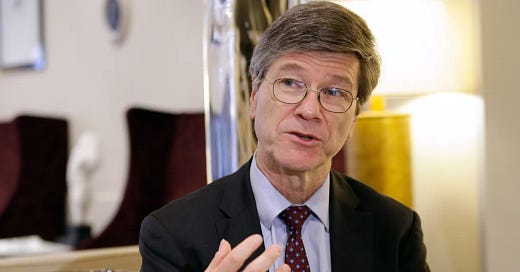Jeffrey Sachs On U.S. Stupidity and Dissolution Of The USSR:
JEFFREY SACHS: "In December 1991, I was leading a delegation of economists to meet with President [of Russia Boris] Yeltsin. The room in the Kremlin was gigantic, almost the size of a football field. We waited and waited, and then, in the very far corner, the door opened, and President Yeltsin came bounding up to the table. He sat down right in front of me. I was the head of our delegation, and he said, 'Gentlemen, I want to make an announcement: the Soviet Union is over.' It was amazing, especially as an American, to hear that in the Kremlin, face to face with the President of Russia—it was a little unusual. He then pointed to the room in the back and said, 'Do you know who I was meeting with back there? I was meeting with the heads of the military, and they have agreed to the end of the Soviet Union. So, I can say the Soviet Union is over.' Well, you don't get too many moments in life like that—this was truly extraordinary. President Yeltsin then went on to say, 'What does Russia want? Russia wants to be a democratic country. Russia wants to be a peaceful country. Russia wants to cooperate.' And the word that he liked most of all: 'Russia wants to be normal. We want to be normal—no more Bolshevism—we want to be normal.' Then it came time for me to speak, and I said, 'President Yeltsin, this is very moving for us, and we are honored to be here with you. I want to assure you that what you have said is the greatest dream of the United States. We've had a Cold War for 45 years. We came to the brink of nuclear war. What you are saying, Mr. President, is truly a symphony for the United States. This is the best possible news.' 'I am also sure that the United States will help you financially, help you stabilize, and help you reform the economy, because what could be more important?' I was wrong. The United States didn't help—at all. And I was also wrong for an interesting personal reason. Two years earlier, I was Poland's advisor. By a strange twist of fate, I became the lead advisor to the Polish government on economic reform as a non-Polish advisor. At the time, I recommended many things that the United States and Europe should do to help Poland, such as not making Poland pay its debts because they were crushing. I recommended canceling half the debts, giving Poland billions of dollars to get started again, and providing some social cushion, and so on. Pretty much whatever I recommended was adopted. Well, I was 35 at the time and thought, 'Pretty good, you know—the President's listening to me, the National Security Advisor's listening to me, Congress is listening to me.' And they did it, and for Poland, it worked. So I thought, 'Russia—well, that's just five times larger.' That was my basic logic. Poland had 40 million people; Russia had about 160 million. I said, 'Just multiply everything by four.' So, if we gave Poland a billion dollars for a stabilization fund, Russia would get four billion. If we had this size loan, Russia would get four times that, and so on, as a rule of thumb. When I recommended the same thing (for Russia), the answer was, 'Nyet, Mr. Sachs, we're not going to do this.' I couldn't understand it. I was naive, of course—I was making economics, but they were making geopolitics. They couldn't get the idea that we would help Russia. 'Are you kidding? Russia's our enemy. Why would we ever help Russia? Of course, we don't want them to collapse and throw up nuclear weapons, but if they just slowly collapse, that's okay.' I don't think there was any goodwill. Bush Sr. turned down all my suggestions, and then Clinton did the same. I ended up resigning at the end of 1993. Since then, I've been blamed for everything that happened there. In fact, I didn't have anything to do with privatization, oligarchs, shares-for-loans, stealing—nothing! I wasn't even there, but I got blamed for all of it. This was also a lesson on how the media works. The media sees you one way, puts a label on you, and it doesn't matter—true, false, anything you say. You can speak for 30 years—nothing matters. Anyway, that was my experience. I'm not even complaining—it was an interesting life experience, a little bizarre. But what I saw was that the U.S. would not lift a finger to really help Russia. I did not understand it for the next 15 years because, among my economist colleagues, everything was a debate: 'Is shock therapy smart or stupid?', 'Is Sachs an idiot?', 'Was that good advice or bad advice?', 'Shouldn't it have been gradual?'—all sorts of arguments that had nothing to do with the real issues we were talking about. Nothing to do with the real issues! Okay, that's academia—completely divorced from what it should be doing if it's not connected to real problem-solving. You can't figure out what's going on in the world unless you're actually trying to solve a problem. And when you get beaten down, you learn something. You learn why things don't work, or why they do."



